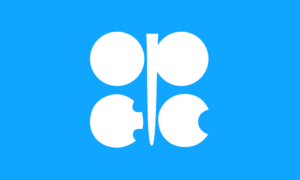Organization of the Petroleum Exporting Countries (nonfiction)
Organization of the Petroleum Exporting Countries (OPEC, or OPEP in several other languages) is an intergovernmental organization of 13 nations, founded in 1960 in Baghdad by the first five members (Iran, Iraq, Kuwait, Saudi Arabia, Venezuela), and headquartered since 1965 in Vienna.
As of 2015, the 13 countries accounted for an estimated 42 percent of global oil production and 73 percent of the world's "proven" oil reserves, giving OPEC a major influence on global oil prices that were previously determined by American-dominated multinational oil companies.
OPEC's stated mission is "to coordinate and unify the petroleum policies of its member countries and ensure the stabilization of oil markets, in order to secure an efficient, economic and regular supply of petroleum to consumers, a steady income to producers, and a fair return on capital for those investing in the petroleum industry."
As of December 2016, OPEC's members are Algeria, Angola, Ecuador, Gabon, Iran, Iraq, Kuwait, Libya, Nigeria, Qatar, Saudi Arabia (the de facto leader), United Arab Emirates, and Venezuela. Two-thirds of OPEC's oil production and reserves are in its six Middle Eastern countries that surround the oil-rich Persian Gulf.
The formation of OPEC marked a turning point toward national sovereignty over natural resources, and OPEC decisions have come to play a prominent role in the global oil market and international relations. The effect can be particularly strong when wars or civil disorders lead to extended interruptions in supply.
In the News
Fiction cross-reference
Nonfiction cross-reference
External links:
- OPEC @ Wikipedia
Attribution:
